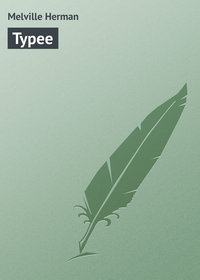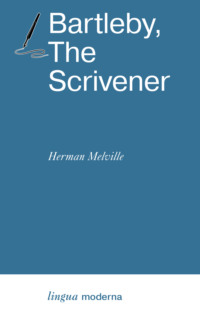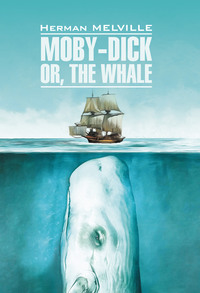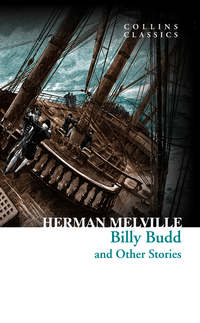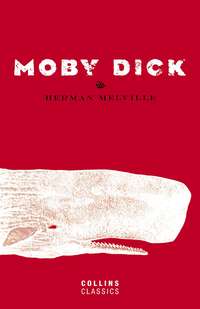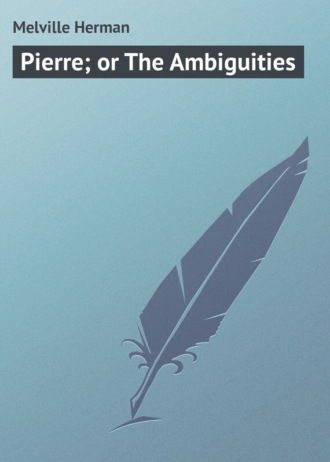
Pierre; or The Ambiguities
"Be seated, sir; stay, shut the door and lock it."
"Madam!"
"I will do it. Be seated. Hast thou seen him?"
"Whom, Madam? – Master Pierre?"
"Him! – quick!"
"It was to speak of him I came, Madam. He made a most extraordinary call upon me last night – midnight."
"And thou marriedst him? – Damn thee!"
"Nay, nay, nay, Madam; there is something here I know not of – I came to tell thee news, but thou hast some o'erwhelming tidings to reveal to me."
"I beg no pardons; but I may be sorry. Mr. Falsgrave, my son, standing publicly plighted to Lucy Tartan, has privately wedded some other girl – some slut!"
"Impossible!"
"True as thou art there. Thou knowest nothing of it then?"
"Nothing, nothing – not one grain till now. Who is it he has wedded?"
"Some slut, I tell thee! – I am no lady now, but something deeper, – a woman! – an outraged and pride-poisoned woman!"
She turned from him swiftly, and again paced the room, as frantic and entirely regardless of any presence. Waiting for her to pause, but in vain, Mr. Falsgrave advanced toward her cautiously, and with the profoundest deference, which was almost a cringing, spoke: —
"It is the hour of woe to thee; and I confess my cloth hath no consolation for thee yet awhile. Permit me to withdraw from thee, leaving my best prayers for thee, that thou mayst know some peace, ere this now shut-out sun goes down. Send for me whenever thou desirest me. – May I go now?"
"Begone! and let me not hear thy soft, mincing voice, which is an infamy to a man! Begone, thou helpless, and unhelping one!"
She swiftly paced the room again, swiftly muttering to herself. "Now, now, now, now I see it clearer, clearer – clear now as day! My first dim suspicions pointed right! – too right! Ay – the sewing! it was the sewing! – The shriek! – I saw him gazing rooted at her. He would not speak going home with me. I charged him with his silence; he put me off with lies, lies, lies! Ay, ay, he is married to her, to her; – to her! – perhaps was then. And yet, – and yet, – how can it be? – Lucy, Lucy – I saw him, after that, look on her as if he would be glad to die for her, and go to hell for her, whither he deserves to go! – Oh! oh! oh! Thus ruthlessly to cut off, at one gross sensual dash, the fair succession of an honorable race! Mixing the choicest wine with filthy water from the plebeian pool, and so turning all to undistinguishable rankness! – Oh viper! had I thee now in me, I would be a suicide and a murderer with one blow!"
A third knock was at the door. She opened it.
"My mistress, I thought it would disturb you, – it is so just overhead, – so I have not removed them yet."
"Unravel thy gibberish! – what is it?"
"Pardon, my mistress, I somehow thought you knew it, but you can not."
"What is that writing crumpling in thy hand? Give it me."
"I have promised my young master not to, my mistress."
"I will snatch it, then, and so leave thee blameless. – What? what? what? – He's mad sure! – 'Fine old fellow Dates' – what? what? – mad and merry! – chest? – clothes? – trunks? – he wants them? – Tumble them out of his window! – and if he stand right beneath, tumble them out! Dismantle that whole room. Tear up the carpet. I swear, he shall leave no smallest vestige in this house. – Here! this very spot – here, here, where I stand, he may have stood upon; – yes, he tied my shoe-string here; it's slippery! Dates!"
"My mistress."
"Do his bidding. By reflection he has made me infamous to the world; and I will make him infamous to it. Listen, and do not delude thyself that I am crazy. Go up to yonder room" (pointing upward), "and remove every article in it, and where he bid thee set down the chest and trunks, there set down all the contents of that room."
"'Twas before the house – this house!"
"And if it had not been there, I would not order thee to put them there. Dunce! I would have the world know that I disown and scorn him! Do my bidding! – Stay. Let the room stand; but take him what he asks for."
"I will, my mistress."
As Dates left the chamber, Mrs. Glendinning again paced it swiftly, and again swiftly muttered: "Now, if I were less a strong and haughty woman, the fit would have gone by ere now. But deep volcanoes long burn, ere they burn out. – Oh, that the world were made of such malleable stuff, that we could recklessly do our fieriest heart's-wish before it, and not falter. Accursed be those four syllables of sound which make up that vile word Propriety. It is a chain and bell to drag; – drag? what sound is that? there's dragging – his trunks – the traveler's – dragging out. Oh would I could so drag my heart, as fishers for the drowned do, as that I might drag up my sunken happiness! Boy! boy! worse than brought in dripping drowned to me, – drowned in icy infamy! Oh! oh! oh!"
She threw herself upon the bed, covered her face, and lay motionless. But suddenly rose again, and hurriedly rang the bell.
"Open that desk, and draw the stand to me. Now wait and take this to Miss Lucy."
With a pencil she rapidly traced these lines: —
"My heart bleeds for thee, sweet Lucy. I can not speak – I know it all. Look for me the first hour I regain myself."
Again she threw herself upon the bed, and lay motionless.
IIITOWARD sundown that evening, Pierre stood in one of the three bespoken chambers in the Black Swan Inn; the blue chintz-covered chest and the writing-desk before him. His hands were eagerly searching through his pockets.
"The key! the key! Nay, then, I must force it open. It bodes ill, too. Yet lucky is it, some bankers can break into their own vaults, when other means do fail. Not so, ever. Let me see: – yes, the tongs there. Now then for the sweet sight of gold and silver. I never loved it till this day. How long it has been hoarded; – little token pieces, of years ago, from aunts, uncles, cousins innumerable, and from – but I won't mention them; dead henceforth to me! Sure there'll be a premium on such ancient gold. There's some broad bits, token pieces to my – I name him not – more than half a century ago. Well, well, I never thought to cast them back into the sordid circulations whence they came. But if they must be spent, now is the time, in this last necessity, and in this sacred cause. 'Tis a most stupid, dunderheaded crowbar. Hoy! so! ah, now for it: – snake's nest!"
Forced suddenly back, the chest-lid had as suddenly revealed to him the chair-portrait lying on top of all the rest, where he had secreted it some days before. Face up, it met him with its noiseless, ever-nameless, and ambiguous, unchanging smile. Now his first repugnance was augmented by an emotion altogether new. That certain lurking lineament in the portrait, whose strange transfer blended with far other, and sweeter, and nobler characteristics, was visible in the countenance of Isabel; that lineament in the portrait was somehow now detestable; nay, altogether loathsome, ineffably so, to Pierre. He argued not with himself why this was so; he only felt it, and most keenly.
Omitting more subtile inquisition into this deftly-winding theme, it will be enough to hint, perhaps, that possibly one source of this new hatefulness had its primary and unconscious rise in one of those profound ideas, which at times atmospherically, as it were, do insinuate themselves even into very ordinary minds. In the strange relativeness, reciprocalness, and transmittedness, between the long-dead father's portrait, and the living daughter's face, Pierre might have seemed to see reflected to him, by visible and uncontradictable symbols, the tyranny of Time and Fate. Painted before the daughter was conceived or born, like a dumb seer, the portrait still seemed leveling its prophetic finger at that empty air, from which Isabel did finally emerge. There seemed to lurk some mystical intelligence and vitality in the picture; because, since in his own memory of his father, Pierre could not recall any distinct lineament transmitted to Isabel, but vaguely saw such in the portrait; therefore, not Pierre's parent, as any way rememberable by him, but the portrait's painted self seemed the real father of Isabel; for, so far as all sense went, Isabel had inherited one peculiar trait no-whither traceable but to it.
And as his father was now sought to be banished from his mind, as a most bitter presence there, but Isabel was become a thing of intense and fearful love for him; therefore, it was loathsome to him, that in the smiling and ambiguous portrait, her sweet mournful image should be so sinisterly becrooked, bemixed, and mutilated to him.
When, the first shock, and then the pause were over, he lifted the portrait in his two hands, and held it averted from him.
"It shall not live. Hitherto I have hoarded up mementoes and monuments of the past; been a worshiper of all heirlooms; a fond filer away of letters, locks of hair, bits of ribbon, flowers, and the thousand-and-one minutenesses which love and memory think they sanctify: – but it is forever over now! If to me any memory shall henceforth be dear, I will not mummy it in a visible memorial for every passing beggar's dust to gather on. Love's museum is vain and foolish as the Catacombs, where grinning apes and abject lizards are embalmed, as, forsooth, significant of some imagined charm. It speaks merely of decay and death, and nothing more; decay and death of endless innumerable generations; it makes of earth one mold. How can lifelessness be fit memorial of life? – So far, for mementoes of the sweetest. As for the rest – now I know this, that in commonest memorials, the twilight fact of death first discloses in some secret way, all the ambiguities of that departed thing or person; obliquely it casts hints, and insinuates surmises base, and eternally incapable of being cleared. Decreed by God Omnipotent it is, that Death should be the last scene of the last act of man's play; – a play, which begin how it may, in farce or comedy, ever hath its tragic end; the curtain inevitably falls upon a corpse. Therefore, never more will I play the vile pigmy, and by small memorials after death, attempt to reverse the decree of death, by essaying the poor perpetuating of the image of the original. Let all die, and mix again! As for this – this! – why longer should I preserve it? Why preserve that on which one can not patient look? If I am resolved to hold his public memory inviolate, – destroy this thing; for here is the one great, condemning, and unsuborned proof, whose mysticalness drives me half mad. – Of old Greek times, before man's brain went into doting bondage, and bleached and beaten in Baconian fulling-mills, his four limbs lost their barbaric tan and beauty; when the round world was fresh, and rosy, and spicy, as a new-plucked apple; – all's wilted now! – in those bold times, the great dead were not, turkey-like, dished in trenchers, and set down all garnished in the ground, to glut the damned Cyclop like a cannibal; but nobly envious Life cheated the glutton worm, and gloriously burned the corpse; so that the spirit up-pointed, and visibly forked to heaven!
"So now will I serve thee. Though that solidity of which thou art the unsolid duplicate, hath long gone to its hideous church-yard account; – and though, God knows! but for one part of thee it may have been fit auditing; – yet will I now a second time see thy obsequies performed, and by now burning thee, urn thee in the great vase of air! Come now!"
A small wood-fire had been kindled on the hearth to purify the long-closed room; it was now diminished to a small pointed heap of glowing embers. Detaching and dismembering the gilded but tarnished frame, Pierre laid the four pieces on the coals; as their dryness soon caught the sparks, he rolled the reversed canvas into a scroll, and tied it, and committed it to the now crackling, clamorous flames. Steadfastly Pierre watched the first crispings and blackenings of the painted scroll, but started as suddenly unwinding from the burnt string that had tied it, for one swift instant, seen through the flame and smoke, the upwrithing portrait tormentedly stared at him in beseeching horror, and then, wrapped in one broad sheet of oily fire, disappeared forever.
Yielding to a sudden ungovernable impulse, Pierre darted his hand among the flames, to rescue the imploring face; but as swiftly drew back his scorched and bootless grasp. His hand was burnt and blackened, but he did not heed it.
He ran back to the chest, and seizing repeated packages of family letters, and all sorts of miscellaneous memorials in paper, he threw them one after the other upon the fire.
"Thus, and thus, and thus! on thy manes I fling fresh spoils; pour out all my memory in one libation! – so, so, so – lower, lower, lower; now all is done, and all is ashes! Henceforth, cast-out Pierre hath no paternity, and no past; and since the Future is one blank to all; therefore, twice-disinherited Pierre stands untrammeledly his ever-present self! – free to do his own self-will and present fancy to whatever end!"
IVTHAT same sunset Lucy lay in her chamber. A knock was heard at its door, and the responding Martha was met by the now self-controlled and resolute face of Mrs. Glendinning.
"How is your young mistress, Martha? May I come in?"
But waiting for no answer, with the same breath she passed the maid, and determinately entered the room.
She sat down by the bed, and met the open eye, but closed and pallid mouth of Lucy. She gazed rivetedly and inquisitively a moment; then turned a quick aghast look toward Martha, as if seeking warrant for some shuddering thought.
"Miss Lucy" – said Martha – "it is your – it is Mrs. Glendinning. Speak to her, Miss Lucy."
As if left in the last helpless attitude of some spent contortion of her grief, Lucy was not lying in the ordinary posture of one in bed, but lay half crosswise upon it, with the pale pillows propping her hueless form, and but a single sheet thrown over her, as though she were so heart overladen, that her white body could not bear one added feather. And as in any snowy marble statue, the drapery clings to the limbs; so as one found drowned, the thin, defining sheet invested Lucy.
"It is Mrs. Glendinning. Will you speak to her, Miss Lucy?"
The thin lips moved and trembled for a moment, and then were still again, and augmented pallor shrouded her.
Martha brought restoratives; and when all was as before, she made a gesture for the lady to depart, and in a whisper, said, "She will not speak to any; she does not speak to me. The doctor has just left – he has been here five times since morning – and says she must be kept entirely quiet." Then pointing to the stand, added, "You see what he has left – mere restoratives. Quiet is her best medicine now, he says. Quiet, quiet, quiet! Oh, sweet quiet, wilt thou now ever come?"
"Has Mrs. Tartan been written to?" whispered the lady. Martha nodded.
So the lady moved to quit the room, saying that once every two hours she would send to know how Lucy fared.
"But where, where is her aunt, Martha?" she exclaimed, lowly, pausing at the door, and glancing in sudden astonishment about the room; "surely, surely, Mrs. Lanyllyn – "
"Poor, poor old lady," weepingly whispered Martha, "she hath caught infection from sweet Lucy's woe; she hurried hither, caught one glimpse of that bed, and fell like dead upon the floor. The Doctor hath two patients now, lady" – glancing at the bed, and tenderly feeling Lucy's bosom, to mark if yet it heaved; "Alack! Alack! oh, reptile! reptile! that could sting so sweet a breast! fire would be too cold for him – accursed!"
"Thy own tongue blister the roof of thy mouth!" cried Mrs. Glendinning, in a half-stifled, whispering scream. "'Tis not for thee, hired one, to rail at my son, though he were Lucifer, simmering in Hell! Mend thy manners, minx!"
And she left the chamber, dilated with her unconquerable pride, leaving Martha aghast at such venom in such beauty.
BOOK XIII.
THEY DEPART THE MEADOWS
IIT was just dusk when Pierre approached the Ulver farm-house, in a wagon belonging to the Black Swan Inn. He met his sister shawled and bonneted in the porch.
"Now then, Isabel, is all ready? Where is Delly? I see two most small and inconsiderable portmanteaux. Wee is the chest that holds the goods of the disowned! The wagon waits, Isabel. Now is all ready? and nothing left?"
"Nothing, Pierre; unless in going hence – but I'll not think of that; all's fated."
"Delly! where is she? Let us go in for her," said Pierre, catching the hand of Isabel, and turning rapidly. As he thus half dragged her into the little lighted entry, and then dropping her hand, placed his touch on the catch of the inner door, Isabel stayed his arm, as if to keep him back, till she should forewarn him against something concerning Delly; but suddenly she started herself; and for one instant, eagerly pointing at his right hand, seemed almost to half shrink from Pierre.
"'Tis nothing. I am not hurt; a slight burn – the merest accidental scorch this morning. But what's this?" he added, lifting his hand higher; "smoke! soot! this comes of going in the dark; sunlight, and I had seen it. But I have not touched thee, Isabel?"
Isabel lifted her hand and showed the marks. – "But it came from thee, my brother; and I would catch the plague from thee, so that it should make me share thee. Do thou clean thy hand; let mine alone."
"Delly! Delly!" – cried Pierre – "why may I not go to her, to bring her forth?"
Placing her finger upon her lip, Isabel softly opened the door, and showed the object of his inquiry avertedly seated, muffled, on a chair.
"Do not speak to her, my brother," whispered Isabel, "and do not seek to behold her face, as yet. It will pass over now, ere long, I trust. Come, shall we go now? Take Delly forth, but do not speak to her. I have bidden all good-by; the old people are in yonder room in the rear; I am glad that they chose not to come out, to attend our going forth. Come now, be very quick, Pierre; this is an hour I like not; be it swiftly past."
Soon all three alighted at the inn. Ordering lights, Pierre led the way above-stairs, and ushered his two companions into one of the two outermost rooms of the three adjoining chambers prepared for all.
"See," said he, to the mute and still self-averting figure of Delly; – "see, this is thy room, Miss Ulver; Isabel has told thee all; thou know'st our till now secret marriage; she will stay with thee now, till I return from a little business down the street. To-morrow, thou know'st, very early, we take the stage. I may not see thee again till then, so, be steadfast, and cheer up a very little, Miss Ulver, and good-night. All will be well."
IINEXT morning, by break of day, at four o'clock, the four swift hours were personified in four impatient horses, which shook their trappings beneath the windows of the inn. Three figures emerged into the cool dim air and took their places in the coach.
The old landlord had silently and despondently shaken Pierre by the hand; the vainglorious driver was on his box, threadingly adjusting the four reins among the fingers of his buck-skin gloves; the usual thin company of admiring ostlers and other early on-lookers were gathered about the porch; when – on his companions' account – all eager to cut short any vain delay, at such a painful crisis, Pierre impetuously shouted for the coach to move. In a moment, the four meadow-fed young horses leaped forward their own generous lengths, and the four responsive wheels rolled their complete circles; while making vast rearward flourishes with his whip, the elated driver seemed as a bravado-hero signing his ostentatious farewell signature in the empty air. And so, in the dim of the dawn – and to the defiant crackings of that long and sharp-resounding whip, the three forever fled the sweet fields of Saddle Meadows.
The short old landlord gazed after the coach awhile, and then re-entering the inn, stroked his gray beard and muttered to himself: – "I have kept this house, now, three-and-thirty years, and have had plenty of bridal-parties come and go; in their long train of wagons, break-downs, buggies, gigs – a gay and giggling train – Ha! – there's a pun! popt out like a cork – ay, and once in ox-carts, all garlanded; ay, and once, the merry bride was bedded on a load of sweet-scented new-cut clover. But such a bridal-party as this morning's – why, it's as sad as funerals. And brave Master Pierre Glendinning is the groom! Well, well, wonders is all the go. I thought I had done with wondering when I passed fifty; but I keep wondering still. Ah, somehow, now, I feel as though I had just come from lowering some old friend beneath the sod, and yet felt the grating cord-marks in my palms. – 'Tis early, but I'll drink. Let's see; cider, – a mug of cider; – 'tis sharp, and pricks like a game-cock's spur, – cider's the drink for grief. Oh, Lord! that fat men should be so thin-skinned, and suffer in pure sympathy on others' account. A thin-skinned, thin man, he don't suffer so, because there ain't so much stuff in him for his thin skin to cover. Well, well, well, well, well; of all colics, save me from the melloncholics; green melons is the greenest thing!"
BOOK XIV.
THE JOURNEY AND THE PAMPHLET
IALL profound things, and emotions of things are preceded and attended by Silence. What a silence is that with which the pale bride precedes the responsive I will, to the priest's solemn question, Wilt thou have this man for thy husband? In silence, too, the wedded hands are clasped. Yea, in silence the child Christ was born into the world. Silence is the general consecration of the universe. Silence is the invisible laying on of the Divine Pontiff's hands upon the world. Silence is at once the most harmless and the most awful thing in all nature. It speaks of the Reserved Forces of Fate. Silence is the only Voice of our God.
Nor is this so august Silence confined to things simply touching or grand. Like the air, Silence permeates all things, and produces its magical power, as well during that peculiar mood which prevails at a solitary traveler's first setting forth on a journey, as at the unimaginable time when before the world was, Silence brooded on the face of the waters.
No word was spoken by its inmates, as the coach bearing our young Enthusiast, Pierre, and his mournful party, sped forth through the dim dawn into the deep midnight, which still occupied, unrepulsed, the hearts of the old woods through which the road wound, very shortly after quitting the village.
When first entering the coach, Pierre had pressed his hand upon the cushioned seat to steady his way, some crumpled leaves of paper had met his fingers. He had instinctively clutched them; and the same strange clutching mood of his soul which had prompted that instinctive act, did also prevail in causing him now to retain the crumpled paper in his hand for an hour or more of that wonderful intense silence, which the rapid coach bore through the heart of the general stirless morning silence of the fields and the woods.
His thoughts were very dark and wild; for a space there was rebellion and horrid anarchy and infidelity in his soul. This temporary mood may best be likened to that, which – according to a singular story once told in the pulpit by a reverend man of God – invaded the heart of an excellent priest. In the midst of a solemn cathedral, upon a cloudy Sunday afternoon, this priest was in the act of publicly administering the bread at the Holy Sacrament of the Supper, when the Evil One suddenly propounded to him the possibility of the mere moonshine of the Christian Religion. Just such now was the mood of Pierre; to him the Evil One propounded the possibility of the mere moonshine of all his self-renouncing Enthusiasm. The Evil One hooted at him, and called him a fool. But by instant and earnest prayer – closing his two eyes, with his two hands still holding the sacramental bread – the devout priest had vanquished the impious Devil. Not so with Pierre. The imperishable monument of his holy Catholic Church; the imperishable record of his Holy Bible; the imperishable intuition of the innate truth of Christianity; – these were the indestructible anchors which still held the priest to his firm Faith's rock, when the sudden storm raised by the Evil One assailed him. But Pierre – where could he find the Church, the monument, the Bible, which unequivocally said to him – "Go on; thou art in the Right; I endorse thee all over; go on." – So the difference between the Priest and Pierre was herein: – with the priest it was a matter, whether certain bodiless thoughts of his were true or not true; but with Pierre it was a question whether certain vital acts of his were right or wrong. In this little nut lie germ-like the possible solution of some puzzling problems; and also the discovery of additional, and still more profound problems ensuing upon the solution of the former. For so true is this last, that some men refuse to solve any present problem, for fear of making still more work for themselves in that way.


